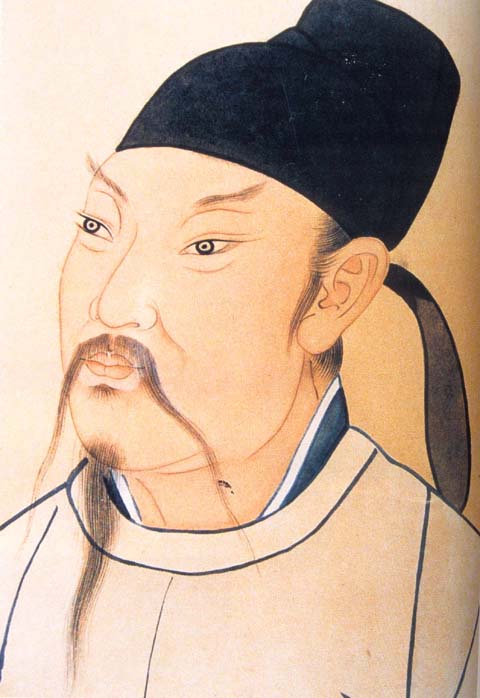Źródło: Jesienna zaduma w: Dzwoneczki nefrytowe w księżycowej poświacie. Wybór wierszy chińskich, z chińskiego przełożył Aleksy Dębnicki, Warszawa 2003, str. 44
Li Bai słynne cytaty
„Kiedyż barbarzyńców uśmierzymy Północy
I miły mój przerwie dalekie pochody?”
Źródło: Jesienna zaduma w: Dzwoneczki nefrytowe w księżycowej poświacie. Wybór wierszy chińskich, z chińskiego przełożył Aleksy Dębnicki, Warszawa 2003, str. 45
Li Bai: Cytaty po angielsku
“See how the Yellow River's waters move out of heaven,
Entering the ocean, never to return.”
"Bringing In The Wine" http://www.sanjeev.net/poetry/po-li/bringing-in-the-wine-109723.html (將進酒)
[38] "Alone Looking at the Mountain"
Variant translations:
The birds have vanished down the sky.
Now the last cloud drains away.
We sit together, the mountain and me,
until only the mountain remains.
"Zazen on Ching-t'ing Mountain", trans. Sam Hamill
Flocks of birds fly high and vanish;
A single cloud, alone, calmly drifts on.
Never tired of looking at each other—
Only the Ching-t'ing Mountain and me.
"Sitting Alone in Ching-t'ing Mountain", trans. Irving Y. Lo
"The Summit Temple" (夜宿山寺), in The White Pony: An Anthology of Chinese Poetry from the Earliest Times to the Present Day (1947), p. 173
"Thoughts on a Still Night" (静夜思); in Jean Ward's Li T'ai-po: Remembered (2008), p. 99
Wariant: Variant translation:
Before my bed the moonlight glitters
Like frost upon the ground.
I look up to the mountain moon,
Look down and think of home.
Źródło: "Quiet Night Thought", in Classical Chinese Literature: An Anthology of Translations (2000), p. 723
“Enjoy a cup of wine while you're alive!
Do not care if your fame will not survive!”
"Hard Is the Way of the World" III http://wengu.tartarie.com/wg/wengu.php?no=84&l=Tangshi, trans. Witter Bynner
“Since life is but a dream,
Why toil to no avail?”
"A Homily on Ideals in Life, Uttered in Springtime on Rising From a Drunken Slumber" (c. 750), in A Golden Treasury of Chinese Poetry: 121 Classical Poems (1976), p. 115
Variant translation by Arthur Waley: "Life in the World is but a big dream; I will not spoil it by any labour or care."
"Viewing the Waterfall at Mount Lu" (望庐山瀑布), trans. Burton Watson
“Oh, but it is high and very dangerous!
Such travelling is harder than scaling the blue sky.”
"Hard Roads In Shu" https://www.poemhunter.com/poem/hard-roads-in-shu/ (蜀道难)
"Question and Answer in the Mountain" https://books.google.ca/books?id=hQ6lGvyMZMMC&pg=PA15
“I sat drinking and did not notice the dusk,
Till falling petals filled the folds of my dress.”
"Self-Abandonment" ( 自遣 http://www.chinese-poems.com/lb14t.html), as translated by Arthur Waley (1919)
朝辞白帝彩云间,千里江陵一日还。
两岸猿声啼不住,轻舟已过万重山。
"Leaving the White Emperor Town for Jiangling", as translated by Xu Yuanchong in 300 Tang Poems: A New Translation, p. 92
"Drinking Alone by Moonlight" (月下獨酌), one of Li Bai's best-known poems, as translated by Arthur Waley in More Translations From the Chinese (1919)
Variant translation:
From a pot of wine among the flowers
I drank alone. There was no one with me—
Till, raising my cup, I asked the bright moon
To bring me my shadow and make us three.
Alas, the moon was unable to drink
And my shadow tagged me vacantly;
But still for a while I had these friends
To cheer me through the end of spring...
I sang. The moon encouraged me.
I danced. My shadow tumbled after.
As long as I knew, we were boon companions.
And then I was drunk, and we lost one another.
...Shall goodwill ever be secure?
I watch the long road of the River of Stars.
"Drinking Alone with the Moon" (trans. Witter Bynner and Kiang Kang-hu)
"The Hard Road" (行路難) I http://wengu.tartarie.com/wg/wengu.php?no=82&l=Tangshi, trans. Witter Bynner
Ballads Of Four Seasons: Summer (子夜四时歌 夏歌)
